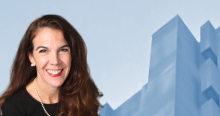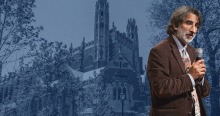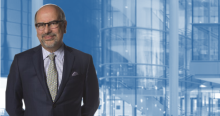Online Programs Making News
Explore More, 2024

Welcome to a new year with Yale Online! We are excited to help you learn like never before in 2024. Our online offerings are designed to unlock your full potential and help you explore your passions. Scroll to find our latest courses and programs:
New Course Alert! Creating Change through Social Entrepreneurship: Want to tackle social and environmental challenges facing your community? Explore ways you can make a positive change through frameworks and strategies from the field of social entrepreneurship. Enroll now.
Apply Today! Medical Software and Medical Artificial Intelligence: Transform your career with Yale's Medical Software & AI Program! Master AI, navigate regulations and join a global network. Apply now.
New Year Vibes! Check out our personal development courses:
Connected Leadership, taught by Peter Boyd, helps you become a better leader by clarifying your purpose, priorities, and potential.
The Science of Well-Being, taught by Dr. Laurie Santos, presents evidence-based strategies to boost mood and build healthier habits.
The Science of Well-Being for Teens is specifically geared towards high schoolers, along with their teachers and parents, to help young people navigate the pressures of adolescence.
Non-Degree Programs from the Yale School of the Environment:
-
Clean and Equitable Energy Development: Shape the future of energy with a focus on fairness and sustainability.
-
Financing and Deploying Clean Energy: Learn the ins and outs of financing and implementing clean energy solutions.
-
Tropical Forest Landscapes: Explore the wonders and challenges of tropical forests and their conservation.
-
Urban Climate Leadership: Dive into the dynamics of leading climate initiatives in urban landscapes.
Are you ready to explore these exciting offerings? Let’s do this.
–Happy learning from Yale Online
Remembering Diana E.E. Kleiner, Dunham Professor of the History of Art and Deputy Provost for the Arts
By The Yale Digital Education Team
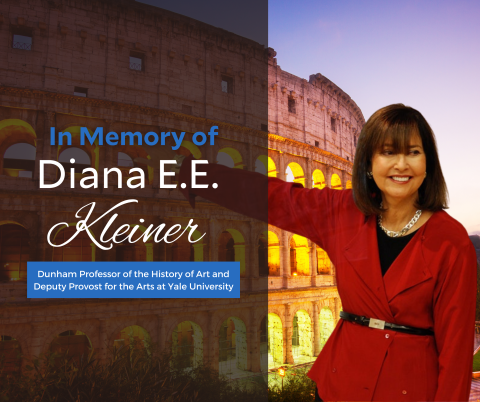
As the Dunham Professor of the History of Art and a Deputy Provost for the Arts at Yale University, few would have expected Diana E.E. Kleiner also to be a visionary for online education. Those fortunate enough to know Diana, though, are aware that her genius, her passion, her curiosity, her tenacity, could never be defined by traditional boundaries.
We are heartbroken with the news that Professor Kleiner passed away on November 12, 2023.
Diana saw the spark of a good idea and believed in its ability to develop it into something with the capacity to change the world. Perhaps this belief owes some thanks to her lifelong study of Rome, the city that became an empire. Long before there was Coursera, EdX, or courses delivered through Zoom, Diana knew that combining education and technology would be transformational. Diana will be celebrated for many personal and professional accomplishments; however, we want to highlight her enormous impact on digital education at Yale University – and around the world.
Informed by Yale’s experience with AllLearn, an early online education partnership with Princeton and Columbia to offer courses to alumni, and inspired by the trailblazing work of MIT’s OpenCourseWare project, Diana set out in 2006 to create a groundbreaking initiative– Open Yale Courses (OYC).
Diana’s relentless belief that the world’s top Universities and faculty members must use new technologies to share their teaching and research with the world, without charge, was reflected in OYC’s straightforward, yet ambitious mission: to expand access to educational materials for all who wish to learn. With the support of then-University President Rick Levin and Vice President and Secretary Linda Lorimer, Diana submitted, and was awarded, a grant from the Hewlett Foundation to launch the "Yale University Open Educational Resources Video Lecture Project.” This project, which aimed to publish content from seven introductory-level Yale College courses on the internet, for free, soon changed its name to Open Yale Courses.
Passionate about the mission to expand access, Diana designed an initiative that set a new standard for online programs. OYC provided audio and video feeds for all seven pilot courses, along with transcripts ready for download to anyone without requiring payment- over the internet. The course website also provided the syllabi and reading lists, along with downloadable versions of assignments, handouts, and assessments for each course. In essence, anyone in the world with an internet connection could experience a Yale College course as if they were inside a New Haven classroom.
Diana also made the bold choice to apply a version of the Creative Commons license that permitted anyone in the world to “[re]distribute, remix, adapt, and build upon the material in any medium or format for noncommercial purposes.” Creative minds across the globe took advantage of this freedom to reimagine and share the content in multiple ways. However, the most powerful action this license allowed was a main reason Diana insisted on including professionally prepared downloadable transcripts for every lecture – the ability for any learner to translate the course into any language. User-generated translations likely resulted in tens of millions of learners having access to Yale content they otherwise would not have been able to engage with.
The decision to use the Creative Commons license was not Diana’s alone. Each faculty member had to agree to this idea, which would essentially give away their intellectual property without remuneration and with minimal control. While the faculty members who took part in OYC believed, and still do, that increasing access to their knowledge is a crucial benefit for humanity, Diana's passion dispelled any reservations they might have had.
Keep in mind as well, Diana had assembled a roster of academic all-stars, acknowledged leaders in their respective fields who had cemented their legacies without needing to participate in this experimental endeavor. Professors Donald Kagan, Ramamurti Shankar, Christine Hayes, Ben Polak, David Blight, Tamar Gendler, Shelly Kagan, Steven Smith, Joanne Freeman - and more - all participated.
The original proposal to the Hewlett Foundation and other early documents related to OYC include many prescient views Diana had about the combination of teaching and technology. For example, here she highlights one benefit of open course projects few were discussing at the time of OYC’s launch.
Universities that share course content also stand to gain from doing so, as their faculty are encouraged to discuss and reexamine pedagogical assumptions and methods, a process that increases their effectiveness in on-campus teaching.
Not many people in 2006 would have imagined putting a course online would make you a better overall teacher. But Diana saw the value in reexamining one’s course for a new medium.
The documents also have inspiring insight concerning who has access to education. With the acknowledgment that a Yale education is best built upon direct interactions, Diana then shared another reason she committed to the mission of OYC.
We also recognize, however, that this form of participation is not always available to all or feasible for all who wish to learn. A variety of financial, personal, and geographic circumstances may present insurmountable obstacles to pursuing the traditional path of study at a world-class college or university.
The principle of equity underlying this statement about access has rightfully been at the foundation of countless initiatives from universities around the world over the last decade.
The groundwork Diana laid with OYC – and the administrative hurdles she cleared – placed Yale in an excellent position when MOOC-mania (massive open online courses) swept the world in 2012. Our university and our faculty were already comfortable with the idea of sharing course content over the internet. Our community was ready to engage, understanding that the recent advancements in Web 2.0 technology Coursera and EdX were leveraging allowed us to offer a new learning experience. One that was like OYC but more social, personalized, and able to provide assessment of learning.
In addition to the lectures she shared with the world, Diana took great care to create digital materials for her students in New Haven. For her two main undergraduate courses at Yale, she created websites and digital experiences. These courses, Roman Art and Roman Architecture, were highly advanced in their use of digital technology and online discussion boards. Diana’s influence could also be seen throughout the different phases of remote teaching in 2020 – 2021.
A fitting tribute we can provide Diana is to encourage all who read this to enroll in her exceptional online course: “introduction to the great buildings and engineering marvels of Rome and its empire, with an emphasis on urban planning and individual monuments and their decoration, including mural painting.”
We extend our appreciation to David Hirsch, Jeffrey Levick, and Paul Lawrence who, as part of the Open Yale Courses project team, contributed to the source documents we referenced in this article.
Newsweek Feature: How to Get an Ivy League Education at Home
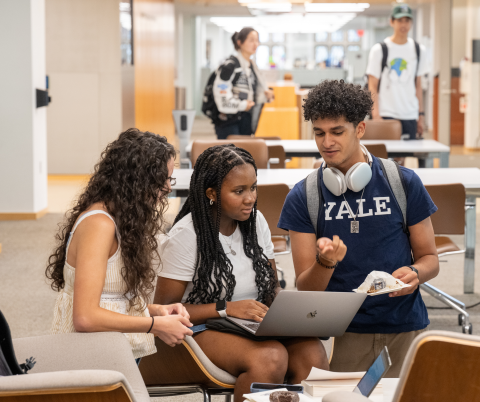
Great news! The Yale Poorvu Center for Teaching and Learning has been featured in Newsweek for the range of course offerings through Yale Online. We're proud to be among the top 10 universities and the top Ivy offering online undergraduate and graduate programs.
And we’re so appreciative of the faculty members and professional schools we partner with to deliver exceptional courses and programs.
The article features Luis Aguirre-Torres, who completed the Yale Center for Business and the Environment's Financing and Deploying Clean Energy certificate program. He shares how Yale’s online programs help students apply what they learn to the real world.
Check out the article to learn how Yale’s online programs deliver engaging and rigorous learning experiences, with greater flexibility: https://tinyurl.com/Yale-Newsweek
Yale Daily News Feature: Yale expands free online course offerings
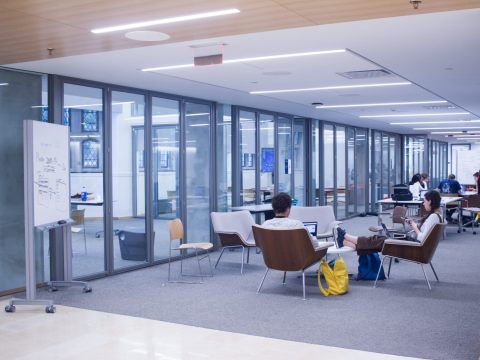
Extra, extra, read all about it! The Yale Daily News featured Yale Online to discuss the growth of our free online course offerings. In the article, we talked about our open courses, degree and non-degree programs, and our role at the Yale Poorvu Center for Teaching and Learning. We also shared exciting news: We’ve experienced a 15.6 percent increase in Coursera enrollments from last year and are on track to enroll 1.62 million learners by the end of 2023. See what our team had to say about spreading Yale's great teaching around the world: https://bit.ly/3MQLtoP
Yale Daily News Feature: Yale researchers receive $4 million from National Institute of Mental Health to advance LGBTQ+-affirming mental health care
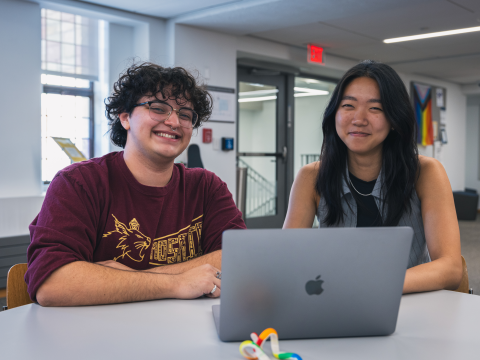
Yale researchers have been awarded a $4 million grant from the National Institute of Mental Health to provide new therapeutic interventions to LGBTQ+ community centers across the US. The team is dedicated to administering LGBTQ+ affirmative cognitive behavioral therapy, with the aim of empowering queer individuals to confront and overcome their current realities. Stay tuned for more exciting news, as Yale Online will be producing an online course on this topic using the grant money. Read more: https://bit.ly/475dGQJ
Enroll Now: New Online Course "Digital Media for Health Outcomes"
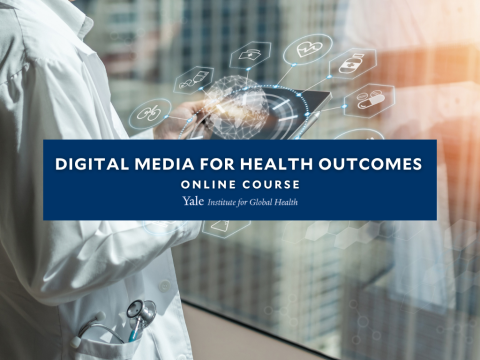
The new online course "Digital Media for Health Outcomes" for health professionals has officially launched on Coursera! Participants will learn how to leverage behavioral insights to design, implement and evaluate digital health communications to drive health outcomes. Led by Dr. Saad B. Omer, the five-module course will feature co-instruction and case studies from the Ad Council, African Union, Africa CDC, Population Services International, UNICEF, World Health Organization, and the Yale School of Public Health. All those who complete the course can earn a Coursera certificate. Click here for more information.
Earn an Online Certificate in Tropical Forest Landscapes
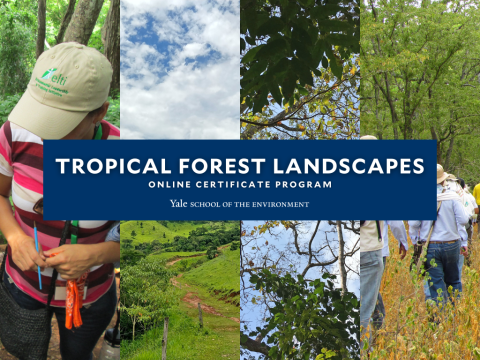
Check out the latest Participant Testimonial Video from Yale’s online certificate program, Tropical Forest Landscapes: Conservation, Restoration & Sustainable Use. This interdisciplinary program explores tropical land management through diverse perspectives in a dynamic online experience. Courses teach core concepts, highlight exciting global case studies, and illustrate practical tools to understand and manage effective conservation and restoration initiatives' complex social, ecological, and economic aspects.
Well-being for teens: A popular course gets a new spin for a new audience
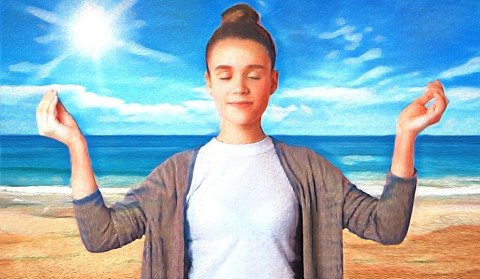
The most popular course in Yale’s history is being revamped for a high school audience.
Five years after “Psychology and the Good Life” enrolled more than 1,000 Yale students — and its subsequent Coursera equivalent gained international recognition — Professor Laurie Santos is returning with a new online version of her innovative course, this time tailor-made for teenagers.
YSE Certificate Programs Advance Climate Solutions and Careers
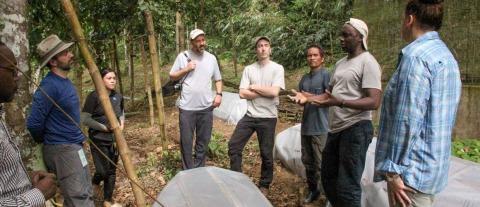
Aimed at accelerating the transition to clean energy and effective tropical forest landscape conservation and restoration, two YSE online certificate programs are having an immediate impact on the environment and the careers of environmental professionals.
Three Classes Celebrate at Inaugural YSM PA Online Commencement Ceremony
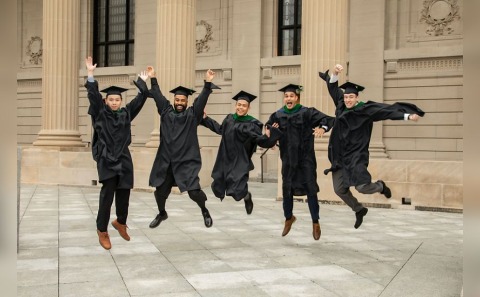
Nearly 90 members of the Yale School of Medicine (YSM) Physician Assistant (PA) Online Program Classes of 2020, 2021, and 2022—and hundreds of family and friends—gathered on May 6 in Woolsey Hall to celebrate at the program’s first graduation ceremony. Since the inaugural cohort of students began the 28-month program in January 2018, 162 have completed the program and received their master of medical science (MMSc) degree....
I Want to Save the World!
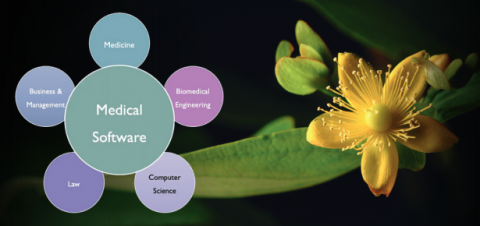
My co-authors and I were having our first meeting with Sara Epperson, Yale’s Director of Digital Education, to discuss our proposal to record a Coursera online class based on our then-upcoming textbook “Introduction to Medical Software: Foundations for Digital Health, Devices, and Diagnostics.” Her opening question to us was “why do you want to record this class?” to which, to my surprise, I blurted out “I want to save the world!” After a period of silence, I then tried to explain (to me as much to her) what I meant by that statement. How can a class (or a textbook) on medical software “save the world?” ...
Yale PA Online Students on Campus for Immersion Week
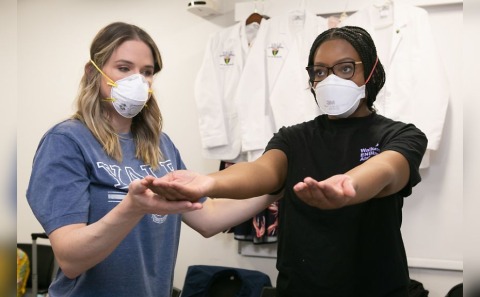
"I'm so glad to be together this time.” James Van Rhee, MS, PA-C, program director of the Yale School of Medicine (YSM) Physician Assistant (PA) Online Program, said in his opening remarks at the March 18 White Coat Ceremony for the 80 members of the PA Online Class of 2024. It was the first White Coat Ceremony the program was able to hold in person on the Yale campus since March 2019, because of COVID-19 restrictions.
The ceremony capped the first-year PA Online students’ week-long campus Immersion, following 11 weeks of online coursework and classes. The students, who live in 28 states, had to spend their initial weekend in New Haven in quarantine, in accordance with Yale’s COVID-19 protocols. They then had three full days of hands-on learning, divided between the anatomy lab and practicing patient assessment in YSM’s clinical skills suite...
Diverse Class of 80 Aspiring PAs Begins Yale's Physician Assistant Online Program
Biomedical engineer for a medical device company. Health Science teacher. U.S. Navy Intelligence professional. Hospital administrator. These roles, held by four members of the Yale School of Medicine Physician Assistant Online (PA Online) Program Class of 2024 prior to starting PA school, are reflective of the class’s diversity. The 80 students in the class began the 28-month program on January 4, 2022.
Class members live in 28 different states; since the program began five years ago, students have come from 44 states and the District of Columbia. The program is designed so that students do not have to relocate. In their first year, students participate in highly interactive classes and course work online, as well as 120+ hours of patient care in or near their home community. Students then spend 15 months performing clinical rotations in or near their home communities. One aim of the program is to train PAs who will practice in their home communities as a way to address the country’s significant primary care needs. Thirty-five percent of the students in the incoming class come from medically-underserved areas and 23% from rural locations.
The geographic flexibility leads to an older class, with an average age of 31 and students ranging from 21 to 52 years-old. Twenty-four percent of students already have an advanced degree, 43% are first-generation, and 25% are underrepresented in medicine.
Yale PA Online Program Director James Van Rhee, MS, PA-C, says, “Every year as we start a new cohort, I am amazed by the wide and varied backgrounds and experiences our students bring to the program.” Learn more about a few members of the class below...
Yale Hosts Free Online Courses on Intersection of Religion and Ecology
The Yale Forum on Religion and Ecology launched a series of massive open online courses, or MOOCs, this month on the Coursera platform that explore world religions and their diverse ecological perspectives.
The courses represent the culmination of a years-long project by John Grim and Mary Evelyn Tucker, co-founders and co-directors of the Yale Forum on Religion and Ecology who are also both senior lecturers and research scholars at the Yale Divinity School and the Yale School of the Environment. These MOOCs have been made free for audit and academically accessible to engage individuals of diverse backgrounds and interests.
“The purpose is to bring the world’s religions into the discussions of the environment, including climate change and biodiversity loss,” Tucker wrote to the News. “This is a life work that brings together our special fields of study in responding to environmental issues.”
Inaugural Online Executive MPH Class Welcomed to Yale School of Public Health
The Yale School of Public Health welcomed 38 working professionals to campus this semester as it launches its inaugural online Executive MPH program.
The part-time program, which takes two years to complete, provides students with a broad foundation in public health and an opportunity to specialize in chosen tracks: Health Informatics, Environmental Health Sciences, Applied Analytical Methods and Epidemiology, and Critical Topics in Public Health. Management and leadership skills are also an explicit component of the curriculum...
How to gain a sense of well-being, free and online
In 2018, when Professor Laurie Santos introduced her course “Psychology and the Good Life,” a class on the science of happiness, it became the most popular in the history of Yale, attracting more than 1,200 undergraduate enrollees that first semester. An online course based on those teachings became a global phenomenon. By latest count, 3.38 million people have enrolled to take the free Coursera.org course, called “The Science of Well-Being.”
7 Tips for Online Learning: How to Excel as an Online Student
Do you know a student juggling the challenges of online learning? Are you enrolled in an online course? Have you decided to continue your education?
The Poorvu Center for Teaching and Learning has supported Yale’s remote learning model since March 2020 and has supported Yale’s online learning initiatives on Coursera since 2014. The Center has developed a list of seven strategies any learner can use to succeed in an online classroom...
Courses You May Enjoy
